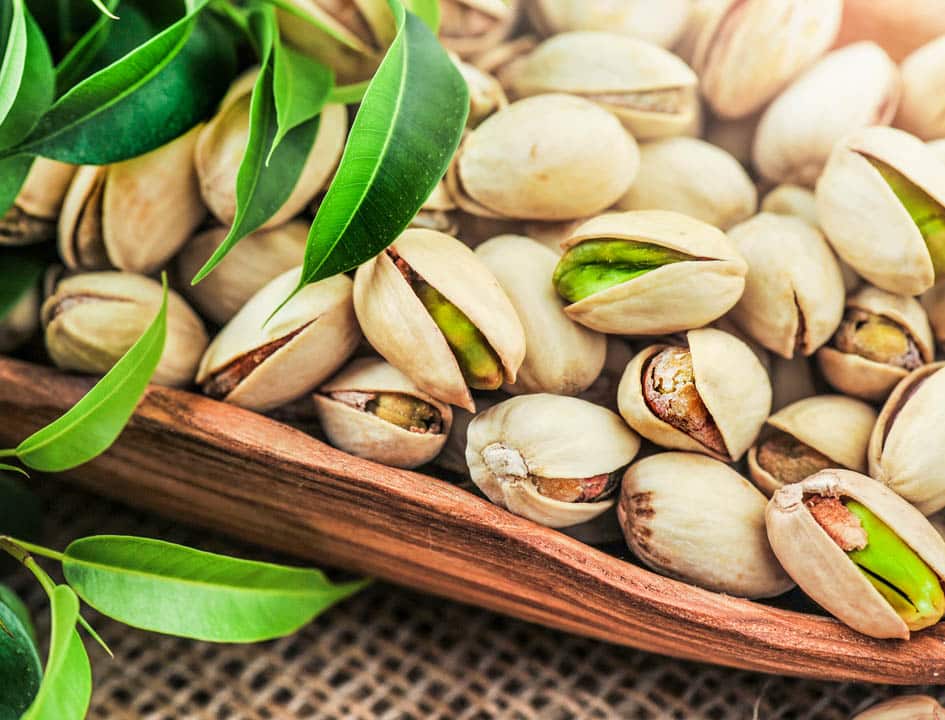written by:
reviewed by:
This nut widely cultivated in the Mediterranean region is surprisingly rich in nutrients. While it may not be feasible to eat this nut every day, here are 10 benefits and why you should add pistachios to your diet.

Table of contents
1. Rich in Vitamins and Minerals
Pistachios are very nutritious, with a 1-ounce serving of about 49 pistachios containing the following nutrients:
- Calories: 159
- Carbs: 8 g
- Fiber: 3 g
- Protein: 6 g
- Fat: 13 g
- Potassium: 6% of the Daily Value (DV)
- Phosphorus: 11% of the DV
- Vitamin B6: 28% of the DV
- Thiamine: 21% of the DV
- Copper: 41% of the DV
- Manganese: 15% of the DV
Pistachios are one of the most vitamin B6-rich foods available, as well as an ounce contains more potassium than half of a large banana.
2. They’re Loaded with Antioxidants
Pistachios contain a higher amount of antioxidants than many other nuts and seeds. They are especially high in lutein and zeaxanthin, both of which are very important antioxidants for eye health. These compounds protect your eyes from damage caused by age-related macular degeneration.
In one 2010 study, people who ate either one or two servings of pistachios per day for 4 weeks had greater levels of two antioxidants, lutein and vitamin E, compared with those who did not eat pistachios.
Furthermore, two of the most abundant groups of antioxidants in pistachios — polyphenols and tocopherols — may help protect against cancer and heart disease.
The antioxidants in pistachios are highly bioavailable. Therefore, they are more likely to be absorbed during digestion.
3. Increased Gut Health
The fiber content in pistachios can help regulate digestion and prevent constipation, which can also aid in weight management. The benefits of eating pistachios also help feed the beneficial bacteria in the gut and improve overall gut health. One serving contains around 3 grams of fiber; gut bacteria convert fiber into short-chain fatty acids like Butyrate. Butyrate is the main energy source for the cells in the colon and meets around 70% of its energy needs. Pistachios are also a great source of anti-inflammatory compounds such as polyphenols and flavonoids. In fact, some studies have shown that consuming pistachios can help reduce markers of inflammation in the blood.
4. Boosted Brain Function
These nuts are rich in vitamin B6, which has been shown to improve cognitive function and mood. Moreover, pistachios contain a variety of minerals that are important for brain health such as magnesium, copper, and zinc. Harvard has stated that vitamin B6 lowers levels of homocysteine as high levels of this protein are linked to cognitive decline. However, don’t rely on foods containing the B6 vitamin or supplements as a preventive measure for cognitive disease.
5. Boosted Immune System
Vitamin B6 is also incredibly important in creating healthy red blood cells, contributing to lymph nodes and spleen health. The anti-inflammatory properties of Gamma-Tocopherol (an antioxidant) and Polyphenols and Carotenoids (lutein and zeaxanthin) may increase the activity of some immune cells.
6. Low in Calories but High in Protein
Pistachios are among the lowest-calorie nuts. Moreover, the protein comprises around 14% of calorie content, with around 6 grams of protein per ounce. This makes pistachios second to almonds in protein content. Vegans and vegetarians take note!
7. Protect Cardiovascular Health
One of the most well-known benefits of pistachios is their ability to promote heart health. They are a great source of monounsaturated and polyunsaturated fats, which can help reduce levels of bad cholesterol in the blood. This, in turn, can help reduce the risk of heart disease and stroke.
8. Blood Pressure
Several studies have shown that there is an inverse relationship between nut consumption and blood pressure or hypertension. However, pistachios seem to have the strongest effect on reducing systolic and diastolic blood pressure. They have also been proven to improve endothelial markers and function.
Vitamin B6 is essential for the production of hemoglobin — the protein responsible for carrying oxygen in the blood. Thus, the high vitamin B6 content of pistachios can ensure a faster production of hemoglobin in the blood. This is especially helpful for those who have low levels of iron in their blood. It is common to think that anemia (low iron) can be helped through iron supplements, however, anemia is actually an insufficient level of hemoglobin unable to carry enough oxygen in the blood. B6 helps with the conversion of iron to hemoglobin.
9. Glucose and Insulin Metabolism
The addition of pistachios to a meal high in carbohydrates with a high glycemic index reduces postprandial glycemia (the measurement of the glucose concentration in the blood in the 4-hour period after eating). The benefits of eating pistachios also proved helpful in diabetes control. In a 2014 study, it was found that the consumption of pistachios as a snack has beneficial effects on glycemic control, blood pressure, obesity, and inflammation markers in diabetic patients.
10. Hair and Nail Health
Pistachios are rich in biotin; there are 5 micrograms per serving. Improvements in hair and nails from biotin supplementation are mostly seen in those who have severe nail brittleness and hair loss. However, there have only been a handful of studies done to establish a link between biotin and hair and nails. One study assessed the effects of 2.5 mg a day of biotin for 6-15 months in women with brittle nails and did find improvement.
How Can I Get More Pistachios Into My Diet?
Regardless of the health benefits of eating pistachios, it’s my favorite nut, and I’ve always seen them as a special treat. Usually, I just have a few nuts as a snack, but there are many recipes and ways to incorporate pistachios into your regular meals. My mother has been a vegan for almost two years now and she introduced me to some amazing food blogs. Here’s a recipe for pistachio-cranberry energy balls from Pick Up Limes, one of my family’s favorite food sites.
These energy balls are great to just keep in your kitchen. I’ve never been someone who eats a big breakfast in the morning and I’m almost always rushing to eat something before leaving the house. Prepping for the morning is a great way to worry less about what you’re going to eat and know you’re getting those healthy fats and vitamins to help sustain your energy.
If you’re looking for how to incorporate pistachios into a more substantial meal, here’s a great recipe from Rainbow Plant Life for roasted veggies with pistachio pesto.
What I love about finding recipes like this is that you can utilize elements such as the pesto recipe and use it for other meals as well. This is especially helpful in boosting your cooking repertoire. One thing I’ve found in my cooking experience is that it’s all about the sauce!
© iStockPhoto.com
The information provided on Health Food Radar is intended for general informational purposes only. While we strive to offer accurate and up-to-date content, we do not provide medical advice, diagnosis, or treatment. Always consult with a qualified healthcare professional before making any dietary or lifestyle changes, especially if you have underlying health conditions or concerns.



